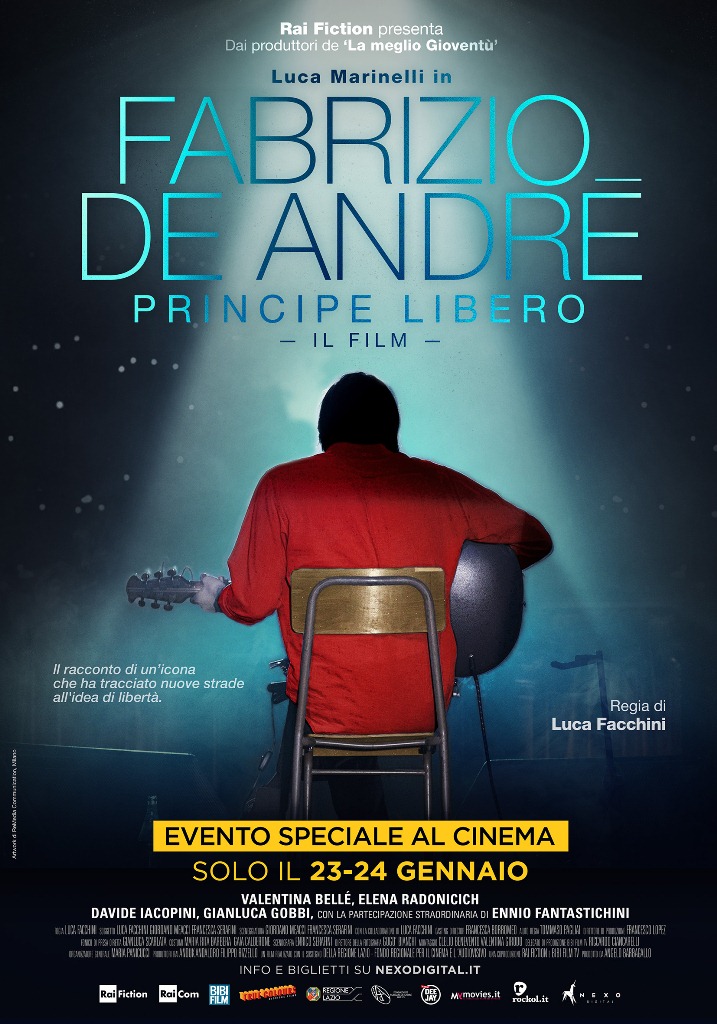Title: Fabrizio De André – Principe Libero
Director: Luca Facchini
Cast: Luca Marinelli, Valentina Bellé, Elena Radonicich, Ennio Fantastichini, Davide Iacopini, Gianluca Gobbi, Lorenzo Gioielli, Anna Ferruzzo, Laura Mazzi, Orietta Notari, Orsetta De Rossi, Matteo Martari, Tommaso Ragno.
If America has Bob Dylan, Italy has Fabrizio De André. The song-writer from Genoa who created musical poetry with his guitar, and a voice profound as his lyrics, lived an extraordinary life between 1940 and 1999. His music was drenched with pacifist and anarchist sympathies, along with meditations on faith, that would also address the hypocrisies of the Catholic Church. Every song was a tale about universal human themes such as love, freedom, and death.
‘Fabrizio De André Principe Libero’ (Fabrizio De André Free Prince) chronicles the life of the greatest poet of Italian music. Since his adolescence Fabrizio (Luca Marinelli) demonstrates his special curiosity: his ardor of life. Always in opposition to authority, in his family and at school, Fabrizio soon developed a great sensitivity for the lives of the wretched – choosing to write songs about gypsies, prostitutes, and rebels. He felt a deeper connection with the marginalized of the “carruggi” (the narrow and dodgy streets of Genoa’s old quarter) than in the bourgeois parties of family friends.
His constant restlessness finally finds meaning when he receives his first guitar as a gift from his father (Ennio Fantastichini). It is love at first sight. Despite this, Fabrizio will have to overcome a great conflict with himself to accept his vocation and transform it into his profession, often finding refuge in alcohol.
The continuous search for space and time to cultivate his art soon come into conflict with Fabrizio’s family duties as a husband to Puny (Elena Radonicich) and father of Cristiano. The human and artistic encounter with Luigi Tenco (Matteo Martari), however, will be fundamental for him, as well as the collaboration with the poet Riccardo Mannerini (Tommaso Ragno). And they will not be the only ones: along his career Fabrizio will collaborate with some key authors and artists of the Italian post-war period, such as Paolo Villaggio (Gianluca Gobbi) and Fernanda Pivano (Orietta Notari), just to name a few.
The meeting with Dori Ghezzi (Valentina Bellè) will lead him to confront his own fears and embrace love, in a new sense of freedom, in the countryside in Sardinia’s Gallura, where they will raise their daughter, Luvi. But the place the musician has elected as his safe haven will also be the stage of Fabrizio’s and Dori’s abduction. The kidnapping will last four months, but after their release, Fabrizio De André, will succeed in transforming the dramatic event into great art, giving us a masterpiece like the song Hotel Supramonte.
Director Luca Facchini has done a remarkable job, with screenwriters Giordano Mecca and Francesca Serafini, in delivering a powerful biopic that glorifies the essence of De André and his music. Although the dramaturgy required a few variations and selections of the songwriter’s life, audiences will leave the screening room feeling enamored with Genoa, and the way the creative process comes to life.
Fabrizio’s songs are the great protagonists of this oeuvre, as they compose the soundtrack of the film, and are interpreted brilliantly by Luca Marinelli who plays De André and evokes his singing pitch majestically. Marinelli approaches a milestone of Italian music, without mimicking the maestro, but rather bringing to life a new character that represents and tributes De André’s zest and work. Likewise, the actresses that play Puny (Elena Radonicich), and Dori (Valentina Bellé), embody the muses and pillars of a man’s creative journey.
Outstanding performances are undoubtably also the ones by Ennio Fantastichini, playing Giuseppe De André the father, Davide Iacopini as the sympathetic brother Mauro, and Gianluca Gobbi who resembles both physically and in temperament Fabrizio’s friend Paolo Villaggio – a notorious Italian actor and comedian. Every element of the film is drenched with adulation and respect for the most impressive musician of the Bel Paese.
‘Fabrizio De André Principe Libero’ is a great cinematic love letter to an extraordinary Italian songwriter that gave a voice to the outsiders of society, expressing his free thought.
Technical: B+
Acting: A-
Story: B+
Overall: B+
Written by: Chiara Spagnoli Gabardi






